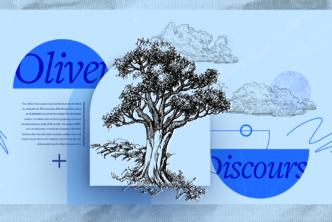Good Friday commemorates the day Jesus taught us how to die.
A caterpillar folds into a cocoon, dies, bursts forth as a butterfly. A seed falls to the ground, gets eaten by the soil, shoots up. A tree sheds its leaves, sprouts buds, dazzles the world with newborn flowers.
It is the way of Christ, the way of creation, and the way of Christians.
This pattern is all over Scripture, but I find a phrase in 2 Corinthians particularly potent: “carrying in the body the death of Jesus, so that the life of Jesus may also be manifested in our bodies” (4:10).
What is it to carry in the body the death of Jesus? We will find out. In entering 2 Corinthians 4:7–10, we see how Good Friday commemorates the day Jesus taught us how to die.
Treasure in jars of clay
7 But we have this treasure in jars of clay, to show that the surpassing power belongs to God and not to us. 8 We are afflicted in every way, but not crushed; perplexed, but not driven to despair; 9 persecuted, but not forsaken; struck down, but not destroyed; 10 always carrying in the body the death of Jesus, so that the life of Jesus may also be manifested in our bodies.
Paul is midway into defending his and Timothy’s apostolic ministry when he says this. He has just finished explaining how their ministry—the ministry of the new covenant—is superior to that of the ministry of the old covenant.
But you wouldn’t know it by looking at it.
When Moses received the ministry of the old covenant—one carved on stones—he came down from Sinai with a face shining like the sun. Even the residual glory of God on Moses’ face was too much for Israel; they had to look at him, a mere man, through a veil (2 Cor 3:7, 13).
But in the new covenant—one written on hearts—we all with unveiled faces behold the glory of the Lord (2 Cor 3:18), for God has “shone in our hearts to give the light of the knowledge of the glory of God in the face of Jesus Christ.”
The covenant is indeed superior.
And yet.
Christians do not glow like Moses. We do not manifest in power. Instead, we are jars of clay. Thin, dusty, fragile, weak, we hold the burning glory of God in our breakable bodies.
Why?
Power in weakness
Paul says this is to show that the surpassing power belongs to God and not to us (4:7). God amplifies his power and glory through hollow, earthen vessels.
Consider the death of Jesus. At the depth of his weakness, when his breath departs, dry bones live again. The veil tears in two. The earth goes dark. The centurion responds, “Surely this man was the Son of God.”
God’s power showed forth in Christ’s suffering, as indeed it does in all cruciform suffering. Paul casts his and Timothy’s suffering in Christ’s pattern, but with an exception: their suffering has limits.
Unlike Paul and Timothy, Jesus was afflicted and crushed (Isa 53:7, 4). He was perplexed and driven to despair (Matt 26:38–39). He was persecuted and forsaken (Isa 53:7, 4; Matt 27:46). He was struck down and destroyed (Matt 27:30, 50). He suffered without limit to show that God’s power has none. It is literally surpassing; no amount of weakness can evade it. And what’s more, weakness becomes a vessel for proclaiming God’s power.
So this is what it is to carry in our bodies always the death of Christ: to suffer like him.
Why ‘in our bodies’?
It is not incidental that Paul says “in our bodies” and “in our mortal flesh” (2 Cor 4:10, 11).

The “we” in “we are afflicted in every way” (4:8) is first Paul and Timothy, and then us by association if we join in imitating them. Remember that later in this letter Paul catalogs his sufferings for Christ:
Five times I received from the Jews the forty lashes minus one. Three times I was beaten with rods, once I was pelted with stones, three times I was shipwrecked, I spent a night and a day in the open sea, I have been constantly on the move. I have been in danger from rivers, in danger from bandits, in danger from my fellow Jews, in danger from Gentiles; in danger in the city, in danger in the country, in danger at sea; and in danger from false believers. I have labored and toiled and have often gone without sleep; I have known hunger and thirst and have often gone without food; I have been cold and naked. Besides everything else, I face daily the pressure of my concern for all the churches. Who is weak, and I do not feel weak? Who is led into sin, and I do not inwardly burn? (2 Cor 11:24–29)
Paul is not speaking abstractly. When he talks about carrying suffering in his body, he’s talking about real scars. “These ones I got in Philippi. These in Derbe,” he might say. “These bags under my eyes? Sleepless nights.”
It costs something to follow Christ, down to the bone. And it’s not just physical affliction a Christian might endure. Books like The Body Keeps the Score have proven convincingly that the body itself holds trauma, whether physical or emotional. Consider how often King David describes his sorrow in bodily terms, such as in Psalm 22, which Christ fulfills:
All my bones are out of joint.
My heart has turned to wax;
it has melted within me.
My mouth is dried up like a potsherd,
and my tongue sticks to the roof of my mouth . . .
. . . they [villains] pierce my hands and my feet. (14–16 NIV)
Our weakness is precisely that we are mortal. A stone to the temple can kill us. Illness can ravage our bodies. We can drown, freeze, fear. If we could not break, it would be unremarkable that we should follow Christ. We imagine Paul as a superhero, but he describes himself as a ragdoll. He takes one look at himself and knows the power belongs to God.
Why is this the way of Christ?
The life side of death
So that.
Suffering is for the “so that”: “so that the life of Jesus may also be manifested in our bodies.”
Behold the meaning of your weakness.
You feel a prick in your heart when you think about sharing the gospel with someone likely to reject you, but you do it anyway. You stand something to lose. But much to gain: the life of Christ revealed.
You suffer from chronic pain, and it would be easier if you just stayed in bed, but you get up and live. You stand something to lose. But much to gain: the life of Christ revealed.
Your marriage is misery and your spouse won’t change, but you hold your vows anyway. You stand something to lose. But much to gain: the life of Christ revealed.
Every suffering you bear—whether for following Christ or merely existing in your mortal flesh—finds its meaning in the death of Christ, which broke through to his life, now your life, to the praise of his glorious grace.
The breaking up of the outward man, the daily dying to self, allows the divine life and glory within to burst forth and drive back the powers of darkness, to the praise of Almighty God. It is precisely the Christian’s utter frailty, which lays… Share on XAfter the night, morning
Jesus is the fallen seed that dies that it might give birth (John 12:24). What ailing body, what despairing soul, cannot find solace in the events of the cross? Christ is our pioneer of suffering.
On Good Friday, you bear witness to the death side of life. You reflect on Christ’s march toward crucifixion, the dismantling of his strength and the dereliction of his soul. What ailing body, what despairing soul, cannot find solace in the events of the cross? Christ is our pioneer of suffering.
And after the darkness, he erupted in light.
So will it be for you.
Each day that you choose to live between the shadow of the cross and the light of the tomb, you proclaim the invincible power of God. Your weakness becomes a cause for glory, not for shame.
Good Friday is a dark night that gives way to a glorious morning. And Good Friday is every day. As Philip Hughes writes:
. . . the breaking up of the outward man, the daily dying to self, allows the divine life and glory within to burst forth and drive back the powers of darkness, to the praise of Almighty God. It is precisely the Christian’s utter frailty which lays him open to the experience of the all-sufficiency of God’s grace, so that he is able even to rejoice because of his weakness.1
Even the night is grace.
So bring your whole self to Good Friday. Watch it die with Christ. And watch something more beautiful emerge soon after: the life of Christ in you.
Related articles
- Good Friday: Sorrow and Hope
- How Soon After the Resurrection Did Christians Worship Jesus?
- The Resurrection of Jesus and One More Reminder of God’s Glory
- The Triumphal Entry: The Pathway to Glory
Related resources
Raymond E. Brown Collection, 5 vols. (AYB Reference Library | AYBRL)
Regular price: $119.99
Christian Approaches to Contemporary Thinking Collection (5 vols.)
Regular price: $79.99







